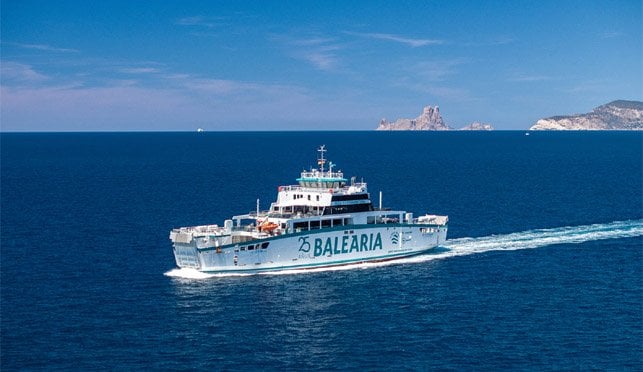Baleària Will Be First to Test Methanol-Powered Electricity Generation

Spanish ferry operator Baleària announced it will begin operations on what is Europe's first autonomous e-methanol power generation system. The eNomad system, developed by Methanol Reformer, will enable renewable hydrogen to be produced from methanol to generate auxiliary electrical energy, and it will be incorporated into the operation of the company’s electric ferry Cap de Barbaria.
The Cap de Barbaria, which has been operating between Ibiza and Formentera since 2023, was designed to integrate a hydrogen system capable of supplying a portion of the energy required by the vessel. The ferry is 3,400 gross tons and sails between Ibiza and Formentera. It is 82 meters (269 feet) and carries up to 390 passengers and 50 vehicles. Known as the first electric ferry in Spain, it sails at speeds of 14 knots and is capable of zero-emission operations during port approaches and while docked.
“This compact equipment enables us to run a small-scale green hydrogen experimental laboratory in a real operating environment and on a route as sensitive and iconic as the one linking Ibiza and Formentera”, explains Javier Cervera, Corporate Director of Institutional Relations and the Energy Transition.
The eNomad system combines electricity generation from hydrogen, produced by reforming e-methanol, with a modular, compact, and autonomous design, capable of operating efficiently in port and maritime environments. Baleària says the pioneering European project will convert the ferry linking Ibiza and Formentera into a hydrogen research laboratory. They expect to validate the performance of the system in real-life operational conditions.
The hydrogen generated by this system will be used to power a fuel cell and produce auxiliary electricity. This electricity will support battery recharging and reduce the use of conventional generators, thereby lowering fuel consumption and emissions. In addition, Baleària will use this compact hydrogen production equipment to test different combinations of batteries and fuel cells in the ship's electric motor.
Through the pilot project, which is part of the BUCEMTO project financed by Net Generation Funds, Baleària reports it will be able to assess the potential of methanol as a flexible energy vector for maritime transport, combining the advantages of an easy-to-store liquid fuel with the possibility of generating hydrogen in situ, without the need for complex large-scale supply infrastructure. In addition, the shipping company will evaluate the hydrogen's contribution to overall consumption, reducing emissions, and the scalability of the solution to other ships and routes operated by the company.
Manufactured by a Catalan company specialising in sustainable energy solutions Methanol Reformer is expected to be available in the coming weeks for the start of the demonstration on the Cap de Barbaria.
The project is the next step in Baleària's efforts to reduce its carbon footprint. The company has 11 dual natural gas-powered vessels, three of which currently use bioLNG, and it is also making progress towards the total electrification of certain routes with 100% electric, zero-emissions fast ferry projects.
